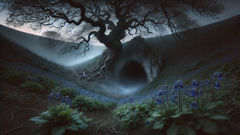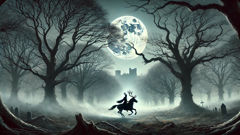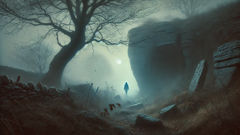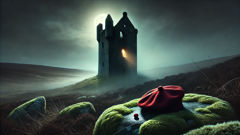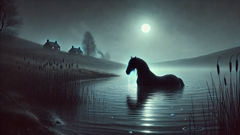Introduction
When twilight seeped across the fields of Leicestershire, villagers would rush to bar their doors, draw heavy curtains, and whisper prayers to ward off the cold. Yet it was not the chill of the coming night they feared, but the ancient presence lurking beyond the hedgerows—a shadow that had haunted the countryside for as long as memory reached. Parents hushed their children with tales of Black Annis, the blue-faced hag with claws like knives and eyes as hungry as winter. They spoke of her lair: a cave carved into the limestone of Dane Hills, shrouded by tangled roots of an ancient oak, its boughs bent and twisted as if recoiling from whatever lay beneath. Some claimed she could smell innocence on the breeze, and that her wails echoed through the woods when she hunted. Others told of the leather skins she wore, tanned from the flesh of her victims, and the bones she scattered among the nettles at the cave’s mouth. But for all the whispers and warnings, the legend of Black Annis was more than a fireside tale; it shaped lives, forged superstitions, and defined the rhythm of existence in these wild, windswept hills.
By day, life in the medieval village of Groby unfolded with familiar ritual: shepherds guiding flocks to pasture, women drawing water at the well, and children stealing moments of play on the edge of the woods. Yet beneath the surface, fear simmered—especially for Elen and her younger brother Tom. Their father, a woodsman, spoke little of Annis, but his gaze lingered on the tree line each evening as he returned home. Elen, old enough to sense the weight of secrets, often wondered whether the stories were warnings or memories. When a string of sheep vanished from the hills one spring and a patch of blue-black fur was found snagged on a fence, villagers muttered that Annis had grown bold again.
This is the story of a night when the legend bared its teeth—a night when Elen would discover the truth behind the stories, and when the village’s courage would be tested against the darkest evil to ever haunt Leicestershire.
I. The Shadow in the Bluebell Wood
For most of the year, the woods above Groby hummed with quiet life. Wild bluebells nodded under the shade of oak and ash, and deer browsed at the forest edge, safe from human eyes. But there were places where even the bravest would not linger: hollows where brambles grew too thick, and patches of earth that seemed to breathe with a coldness out of season. There, beneath the heavy canopy, stories said Black Annis watched from her lair—her blue skin blending with the dusk, her yellow eyes never blinking.
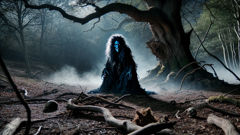
Elen had grown up on the legend. She’d heard it from her mother in a hush, and from old men at the fire after the harvest. Annis was said to be older than the stones themselves, an ancient spirit of vengeance who’d once been a nun, wronged and twisted by suffering, or perhaps something far older—a remnant of the wild gods who haunted Britain before the coming of the cross. No one agreed on her origins, but all agreed on her hunger.
As spring unfolded, the village fretted. Sheep disappeared from pasture, their remains found torn and scattered. Dogs whimpered and cowered as night fell, refusing to cross certain thresholds. Elen’s father set his traps deeper than before and returned with eyes rimmed red from sleepless nights. He pressed a rough charm into Elen’s palm—a twisted root tied with red thread. “Keep it with you,” he said. “And never go near Dane Hills after sunset.”
But Tom, her younger brother, was restless. He wanted to prove himself braver than the older boys. One evening, after supper, he slipped out with a lantern, determined to bring back proof of Annis or her lair. Elen realized he was missing only when she saw the empty hook by the door and the faint glow winding up the path toward the woods.
Fear propelled her through thickets and thorns. She called his name, voice muffled by the hush that fell as dusk deepened. The trees pressed closer, and the ground became soft and cold beneath her feet. At the edge of a clearing, she found Tom’s lantern, its glass shattered and its flame guttered out. Something had dragged him further into the shadows.
She followed clawed prints in the mud—long, twisted, unmistakably inhuman. The path led toward the ancient oak, its roots like fingers clutching the earth. The cave yawned before her, black as pitch, its mouth strewn with bones. She hesitated, recalling every warning and prayer she’d ever learned, but Tom’s muffled cries echoed from within.
With a trembling hand, she gripped the root-charm, drew a breath thick with moss and fear, and stepped into the darkness. Inside, the air was damp and heavy with the stench of old death. Elen’s heart hammered as she crept forward. Shapes loomed on the walls: ragged skins, faded by time; talismans of bone strung on sinew. In the farthest corner, Tom cowered in a cage of twisted willow, his eyes wide with terror.
But before Elen could reach him, a shadow moved—a shape hunched and immense. Black Annis emerged from deeper darkness, her skin a mottled, bruised blue, lips drawn back in a snarl that revealed yellowed teeth. Her nails were black and curved like sickles, her hair wild and tangled, her eyes burning with hunger.
Elen stumbled back, clutching the root charm to her chest. The hag’s gaze fixed on her, and for a moment the air seemed to freeze. “Another child for my larder,” Annis rasped, voice like wind through dead leaves. She reached out a claw, moving with uncanny swiftness, but Elen darted aside, heart pounding.
Desperate, Elen remembered her grandmother’s story: that Annis was bound by old laws, unable to cross a circle of rowan and red thread. With trembling fingers, she traced a circle on the cave floor, whispering prayers and words she barely remembered. The hag howled, recoiling as if struck. Elen used the moment to grab Tom’s arm and wrench open the cage. Together they stumbled for the entrance, chased by Annis’s furious wails.
They burst from the cave as the last glimmer of twilight faded, running until they reached the first lights of Groby. Behind them, the woods erupted with shrieks and howls. That night, no villager slept soundly. The legend had become real, and Elen had glimpsed the full horror—and the strange rules—that bound Black Annis to her lair.
II. The Night of Warding
Word spread quickly through Groby that Black Annis had tried to claim two children. Elen’s father gathered the villagers at the church, their faces drawn and pale in the candlelight. No one doubted Elen’s story—the marks on Tom’s arms, the talismans she’d retrieved from the cave, and the wailing that had echoed through the night were proof enough. The legend was no longer distant; it stalked them, hungry and emboldened.
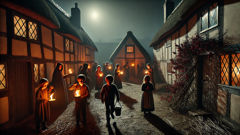
In ancient times, it was said, the people of Leicestershire had held great bonfires to keep Annis at bay. Now, old customs were hastily revived. Villagers strung rowan branches and red thread over doors and windows. Prayers were whispered in Latin and in the half-remembered tongue of their ancestors. Salt was scattered at thresholds, and the youngest children were kept indoors from dusk until dawn.
Elen was haunted by what she’d seen. In dreams, she heard Annis’s voice—rasping, ancient, hungry. She saw the shadows lengthen in the woods and felt the weight of secrets pressing on her chest. When she woke, she found claw marks scored into the wood of the shutters and tufts of blue-black hair tangled in the hedges.
Desperate for answers, Elen visited Old Nan, the village wise woman. Nan lived in a cottage at the edge of the woods, her shelves lined with jars of roots and vials of cloudy liquid. She listened to Elen’s tale, nodding gravely. “Annis is bound to her lair by old magic,” Nan explained. “She cannot cross running water nor enter a home unbidden. But she grows bold when fear runs thick.” Nan gave Elen a bundle of dried herbs—sage, mugwort, and rue—and taught her a chant to strengthen the protective circles.
On the second night, the village watched as clouds blotted out the moon. The woods seethed with movement—foxes fleeing, owls silent. Elen’s family huddled by the hearth. Tom clung to her arm, his small body trembling. Suddenly, a scream shattered the night—the shepherd’s wife had left a window unbarred, and something had reached inside. Villagers raced to her cottage, finding only shredded curtains and a patch of blue-black fur.
Panic threatened to overwhelm them. Elen’s father addressed the villagers with a voice that shook but did not break: “We must not yield to fear. Black Annis thrives on it.” He organized a watch—men with torches and pitchforks patrolled the fields while women kept the children close.
Elen, unable to sleep, crept to her window. In the flickering torchlight, she saw movement at the edge of the fields: a hunched figure, eyes glowing like embers. Black Annis prowled along the hedgerows, seeking a weakness. Elen pressed her charm to the glass and whispered Nan’s chant. The figure paused, then melted back into the darkness.
The siege lasted three nights. Each evening, Annis grew bolder—scratching at doors, howling beneath windows, leaving gifts of bones on doorsteps. But the protective charms held. On the fourth dawn, villagers found claw marks on every house but no one missing. Hope flickered; perhaps the old magics still had power.
III. The Reckoning Beneath the Oak
Though the village had survived three nights of terror, the sense of safety was fragile. Crops withered along the forest’s edge; livestock grew lean and sickly. Some claimed to hear Annis’s laughter in the wind; others found strange sigils carved into tree trunks—warnings or curses, no one knew for sure. As summer deepened, Elen felt the hag’s presence growing heavier, as if the land itself braced for a final reckoning.
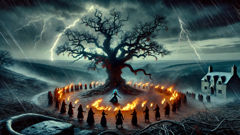
Determined to end the curse, Elen, Tom, and their father returned to Old Nan’s cottage. Nan shared a plan: Annis could be bound anew if a circle of fire and rowan was laid at her lair’s mouth at midnight, sealing her beneath the earth for another generation. “But it will take courage and unity,” Nan warned. “Annis is strongest when she smells fear and division.”
A small band of villagers volunteered to help. On the appointed night, they crept toward Dane Hills under a sky bruised purple with storm clouds. The ancient oak loomed above the cave, its roots writhing like serpents in the shifting moonlight. Armed with bundles of rowan, torches, and charms woven by Nan’s wrinkled hands, they formed a circle around the entrance.
As midnight tolled, Black Annis erupted from the cave in a flurry of shrieks and claws. Her blue face gleamed with unholy light; her mouth twisted into a snarl. “You think you can bind me?” she howled, voice echoing through bone and stone. Wind howled and rain lashed down, threatening to snuff out their torches.
Elen stood firm at the circle’s northern point, Tom clutching her hand. Together they chanted Nan’s words—old magic, strong as the bones of the earth. Annis hurled herself against the fire, but each time she tried to cross, flames leapt higher, fueled by their courage and the power of ancient faith.
The battle seemed endless. Annis’s claws flashed, and one by one, villagers faltered—terrified, exhausted, nearly overwhelmed. But Elen remembered her grandmother’s stories: that light could drive out darkness if the heart stood strong. She raised her charm high and shouted the final line of Nan’s spell with every ounce of defiance she could muster.
A bolt of lightning split the sky, illuminating the oak and the writhing hag in searing white. Annis shrieked, staggering back into her lair. The villagers flung their rowan branches onto the fire, sealing the entrance as stone groaned and earth shifted. With a roar like a thousand storms, the cave mouth collapsed, roots folding over it as if the ancient oak itself had chosen to lock the evil away.
In the sudden silence, dawn broke over Dane Hills. The spell held. Annis was bound beneath rock and root—her hunger sated for another age. The villagers embraced, tears mingling with rain, grateful and forever changed.
Conclusion
Long after that night, the people of Groby carried scars and wisdom earned through fear and defiance. The legend of Black Annis was whispered to every new child—the story of the blue-faced hag who haunted the wild hills, and of those who faced her darkness with trembling courage. The oak above the old cave grew ever more twisted, its roots thick as a man’s arm, its branches reaching toward the sky as if to ward off evil itself. Rowan trees were planted at every doorstep, and each spring the villagers renewed their charms—not out of blind fear, but in honor of those who stood together when the night was darkest.
Elen and Tom grew up with a new understanding of courage—not as the absence of fear, but as the choice to stand fast even when the shadows pressed in. Groby thrived in the years that followed, its people united by memory and hope. And though Black Annis’s hunger was bound beneath earth and root, her legend remained—a warning and a promise that evil could be resisted if hearts stayed true.
To this day, travelers through Leicestershire sometimes shiver when dusk falls over Dane Hills. Some claim to hear faint wails on the wind or glimpse blue shadows in the mist. But those who remember the story know: while darkness may never be banished forever, it can always be held at bay—by courage, unity, and the light we choose to kindle against the night.

